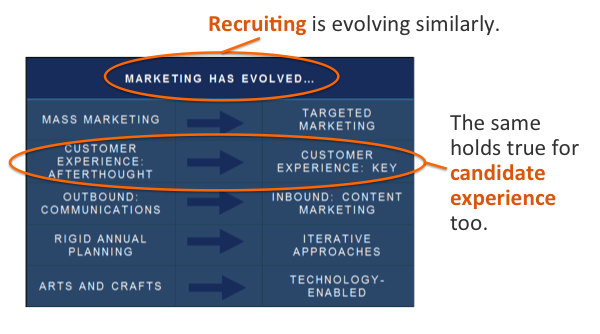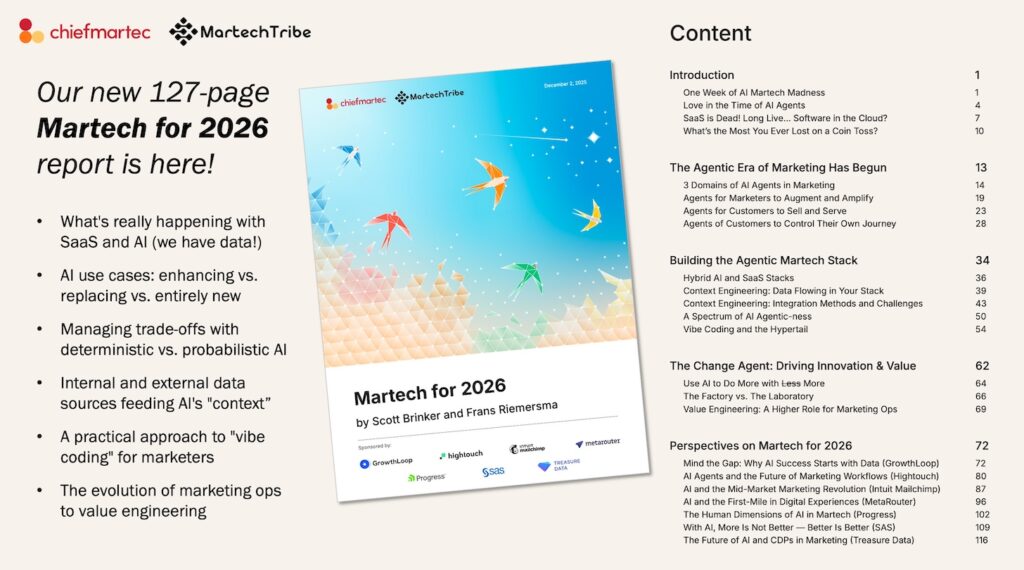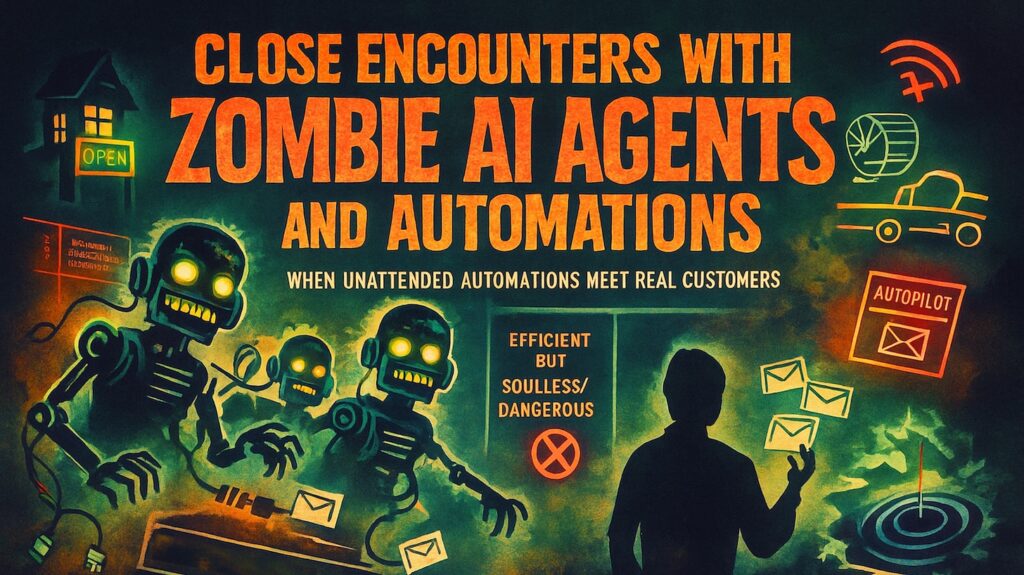Pretty much everybody acknowledges that talent acquisition in marketing today is a hard problem — especially for technical talent for marketing technology, marketing operations, and marketing analytics.
But that’s kind of like complaining that winter is cold in Boston. It’s a true statement, yes, but complaining about it doesn’t make you any warmer. You need to get yourself a sweater, a jacket, and a wool hat. You need to make sure your heating system is in working order. And you might want to pick up some hot cocoa while you’re at it. That’s how you get through a cold winter in Boston.
Of course, for your first winter in Boston, it really helps to have a friend who’s been through those winters — and figured out not only how to stay warm, but how to have fun in the land of the polar vortex.
Erica Seidel is such a friend for conquering the winter of technical marketing recruiting, the founder of The Connective Good, a boutique recruiting agency that specializes in placing data-driven executives in marketing who have a highly analytical/quant bent. She has a background herself in new product development and customer experience roles in the high-tech industry for companies such as Forrester, Sony, Bose, Pitney Bowes, IBM, and Sun Microsystems.
Her blog on recruiting advice is, quite simply, the best I’ve ever read in this space. She’s incredibly generous with her insight in finding, evaluating, and selling great candidates. I’ve had several fascinating chats with her over the years, and in programming the MarTech Conference — coming up next month — I was thrilled that she agreed to be one of our featured speakers, to share her perspective and experience with our audience in a lively TED-style talk on The Talent Land Grab in Marketing: How to Win.
In conjunction with her commitment to speak at MarTech, Erica decided to launch a qualitative research project on the current state of recruiting marketing tech talent — not just within her practice, but through a series of interviews with hiring executives across the industry at both brands and agencies. She’ll be sharing her results in her presentation next month, but she agreed to give us a sneak preview of her findings — as well as some of her frameworks for successful recruiting in this space — in this Q&A.
Tell us a little about your background and your company, The Connective Good.
My own background is a blend of technology and marketing, which is why I’ve chosen that intersection for my recruiting practice. I started my career doing new product development and user experience design with tours of duty at Sony, IBM, and Sun Microsystems (now Oracle). I then got an MBA in marketing at Wharton. Later, at Forrester Research, I led The CMO Group and Interactive Marketing Councils, which are advisory businesses that offer Fortune 500 marketing execs peer-to-peer education. I’ve always had a knack for connecting people, and I also love understanding people through their career paths. So launching my own recruiting practice was a natural next step.
The Connective Good is focused on placing senior data-driven marketing professionals with a highly analytical/quantitative bent. We are engaged to connect organizations to a wider talent market — people who normally wouldn’t know about them. I love helping organizations to articulate and market their secret sauce to a niche audience.
I’m fascinated by the research you’ve done — and looking forward to hearing more details about it at MarTech next month. Can you share some of your findings on the common characteristics of people who tend to be “great hires” in this space? As hiring managers, what should we be looking for?
The greatest hires will have capabilities across what I call the three A’s: Aptitude, Attitude, and Altitude. Specifically, the picture that is emerging of the ideal marketing technologist looks like this:
Aptitude:
- Stay on top of technology trends and tools
- Develop a nuanced understanding of the customer journey and add value to it across multiple channels
- Convince others what a technology investment will do for the organization
- Translate between technical and less-technical people
- Embrace data continuously
Altitude:
- Be able to walk into a meeting with either the CMO or the CIO and add value
- Scale and optimize efforts to be successful across the organization
- Go beyond simply buying technology for its own sake — build integrated platforms that link to overall strategic goals
Attitude:
- Be hands-on, doing the dirty work when necessary
- Be comfortable working autonomously, since many companies only have one marketing technologist
- Be, in the words of one person I spoke with, “precise without being a perfectionist”
- Be able and ready and willing to learn
Of all of these, the #1 wish list item is the last one: the ability to learn. Hiring managers are valuing people with the curiosity and resourcefulness and flexibility to find an answer in a rapidly-changing world. And this is not surprising, given how quickly technology shifts.
Hiring managers are valuing people with the curiosity and resourcefulness and flexibility to find an answer in a rapidly-changing world.
For those of us who are hiring managers, especially in this fast-moving space of analytical and technical marketers, how should we think about talent acquisition? Is there a high-level framework you’d recommend?
I love frameworks! The main talent acquisition challenges facing hiring managers are:
- Sourcing talent
- Evaluating talent
- Selling talent
The higher you reach when sourcing talent, the more you have to focus on selling that talent — creating a compelling value proposition for them to join your team.
The most successful hiring managers realize that selling doesn’t just happen at the end of the process, where you flip like a pancake from evaluating a candidate to pitching her. They realize that an uninspired outreach to a candidate is easily ignored, shrinking the available talent pool event more. They seek to understand what matters to a candidate from the very first interaction, and build their pitch to respond to that. They treat the candidate experience with the same diligence they apply to their customer experience, since they know that every single touchpoint with a candidate is a selling moment. They skillfully weave engaging evaluation and savvy selling like a DNA double helix.
They treat the candidate experience with the same diligence they apply to their customer experience, since they know that every single touchpoint with a candidate is a selling moment.
On the evaluation side, I have written previously on this:
Is This Analytical Marketing Person Any Good? Interviewing With The BATS Framework
Five Steps To A More Predictive Recruiting Process: Going Beyond Interviews…To Assessments
Let’s zoom in specifically on the “find the talent” stage. Everyone talks about the low supply and high demand in this space. What are a few suggestions you’d make for ways hiring managers can think outside the box in sourcing talent? What about people without marketing backgrounds?
A common refrain I’ve been hearing in my research is, “If I could just get more people into my hiring funnel, I can close them.” The challenges with the limited supply may reflect:
(1) An over-reliance on “post and pray” recruiting. Often, organizations will post their job openings on LinkedIn and other job boards, and pray that qualified candidates will come out of the woodwork. They are often disappointed when candidates fail to materialize. It’s a bit like fishing in the Hudson River — you may find an interesting fish this way, but you will also reel in many fish that you end up returning to the water.
Organizations will post their job openings on LinkedIn and other job boards, and pray that qualified candidates will come out of the woodwork.
(2) Semantics. Job titles in this space are all over the map: Marketing Technologist, Information Management and Analytics, Business Intelligence, Performance Marketing, Marketing Operations. And more! Someone may have a title very different from “marketing technologist” but still be very well-suited to the job. This lack of standardization may make it harder for talent and hiring managers to find each other.
Yet smart hiring managers are getting around the supply problem with creative and proactive approaches. For instance, I talked to one who tapped into the marketing technology vendor landscape for hiring: he looked at Marketo’s user group and found someone who was active in that community, frequently helping others. This was clearly someone who gave back, was a strong problem-solver, and knew things well enough to teach them.
One interviewee built a large and successful marketing analytics practice at a large consultancy by hiring financial quants — people with zero marketing experience — out of imploding investment banks.
The lesson here: be comfortable looking outside of your industry — and outside of marketing. If the most important thing is the ability to learn, relax your expectation that a candidate needs to check every single box on day one.
Be comfortable looking outside of your industry — and outside of marketing.
And I read once about a company that identified a “Most Wanted” list of candidates and sent cookies to them on their birthdays to stoke a dialogue, with great effect.
When hiring a more senior “chief marketing technologist” type role, someone who is going to have to build out a team, what capabilities should we look for that go beyond technical expertise? How do we evaluate those?
Senior-most marketing technologists need to scale their technology environment and its impact across the organization.
For that, you will need people who enjoy not just coming up with a new solution, but also making that solution repeatable and standardized. Look for evidence that a candidate embraces simplicity, since it is in reducing ambiguity that their solutions can be broadly applied.
Look for evidence that a candidate embraces simplicity, since it is in reducing ambiguity that their solutions can be broadly applied.
At the same time, an effective chief marketing technologist will focus on cross-training the team, to develop their altitude and provide fresh challenges. This cross-training builds organizational nimbleness, which is essential to responding to changes in technology and markets. For instance, training your social media experts to widen their skillset to include content marketing could be more efficient than hiring a whole new content marketing team.
How do you see the process of talent acquisition in this space evolving? What do you think of the role of HR versus recruiters in this space?
I see talent acquisition becoming much more agile, just as marketing has become more agile. It may sound obvious, but to land the best talent in this area, a recruiter — whether internal or external — needs:
- Fluency in marketing transformation in general, and marketing tech in particular.
- The freedom and time and interest to proactively and personally scout talent, such as through personal outreach, social media, and attending conferences.
Thank you, Erica!
Readers: Erica has a few interview slots remaining in her research, so if you’d like to share your stories on recruiting marketing technology talent, email her at erica@theconnectivegood.com. She will unveil her research in more depth at the MarTech conference in August.




